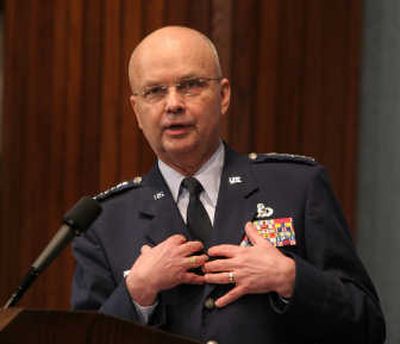CIA ties Al-Qaida to Bhutto’s killing

WASHINGTON – The CIA has concluded that members of al-Qaida and allies of Pakistani tribal leader Baitullah Mehsud were responsible for last month’s assassination of former Pakistani Prime Minister Benazir Bhutto and that they also stand behind a new wave of violence threatening that country’s stability, the agency’s director, Michael Hayden, said in an interview.
Offering the most definitive public assessment by a U.S. intelligence official, Hayden said Bhutto was killed by fighters allied with Mehsud, a tribal leader in northwestern Pakistan, with support from al-Qaida’s terrorist network. That view mirrors the Pakistani government’s assertions.
The same alliance between local and international terrorists poses a grave risk to the government of President Pervez Musharraf, a close U.S. ally in the fight against terrorism, Hayden said in a 45-minute interview with the Washington Post.
“What you see is, I think, a change in the character of what’s going on there,” he said. “You’ve got this nexus now that probably was always there in latency but is now active: a nexus between al-Qaida and various extremist and separatist groups.”
Hayden added, “It is clear that their intention is to continue to try to do harm to the Pakistani state as it currently exists.”
Days after Bhutto’s Dec. 27 assassination in the city of Rawalpindi, Pakistani officials released intercepted communications between Mehsud and his supporters in which the tribal leader praised the killing and, according to the officials, appeared to take credit for it. Pakistani and U.S. officials have declined to comment on the origin of that intercept, but the administration has until now been cautious about publicly embracing the Pakistani assessment.
Many Pakistanis have voiced suspicions that Musharraf’s government played a role in Bhutto’s assassination, and Bhutto’s family has alleged a wide conspiracy involving government officials. Hayden declined to discuss the intelligence behind the CIA’s assessment, which is at odds with that view and supports Musharraf’s assertions.
“This was done by that network around Baitullah Mehsud. We have no reason to question that,” Hayden said. He described the killing as “part of an organized campaign” that has included suicide bombings and other attacks on Pakistani leaders.
Some administration officials outside the agency who deal with Pakistani issues were less conclusive, with one calling the assertion “a very good assumption.” One of the officials said there was no “incontrovertible” evidence to prove or rebut the assessment.
Hayden made his statement shortly before a series of attacks occurred this week on Pakistani political figures and army units. Pakistani officials have blamed them on Mehsud’s forces and other militants.
For more than a year, U.S. officials have been nervously watching as al-Qaida rebuilt its infrastructure in the rugged tribal regions along the border between Afghanistan and Pakistan, often with the help of local sympathizers.
In recent months, U.S. intelligence officials have said, the relationship between al-Qaida and local insurgents has been strengthened by a common antipathy toward the pro-Western Musharraf government. The groups now share resources and training facilities and sometimes even plan attacks together, they said.